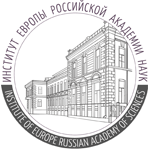institute of europe
the institute of europe of the russian academy of sciences
Arctic region: is it possible to move from confrontation to cooperation?
- 29 April 2022
On April 29, 2022, Valery P. Zhuravel and Diana S. Timoshenko, Research Fellows of the Center for Arctic Studies, Department of Country Studies, IE RAS, took part in a meeting of the International Expert Council for Cooperation in the Arctic (IECCA) on the topic "The Arctic region: is it possible to move from confrontation to cooperation?"
The meeting was opened by the Chairman of the International Expert Council for Cooperation in the Arctic, Director General of the Center for Strategic Assessments and Forecasts, a member of the Scientific Council (the Security Council of Russian Federation), Doctor of Technical Sciences Sergey N. Grinyaev. He noted that the main goal of the event is to analyse and summarise the current situation in the Arctic and the Arctic Council.
Head of the Center for Arctic Studies IE RAS Valery P. Zhuravel made a report "The consequences of the withdrawal of several countries from Russia's chairmanship in the Arctic Council for international cooperation", in which he assessed the event and consequences for international cooperation. Mr. Zhuravel noted that the boycott of Russian Federation's chairmanship in the Arctic Council (AC), increased uncertainty about the plans for the Arctic development, and grossly disrupted the balance of solidarity, which was formed and consistently strengthened during the 25 years of activity in the AC. The researcher expressed hope that the founding countries of the Council will show common sense in 2022 and return to constructive interaction within the AC, and in May 2023 the chairmanship will be transferred to Norway.
Senior Research Associate of the Center for Arctic Studies IE RAS Diana S. Timoshenko presented a report "The Arctic strategy of the European Union and the sanctions pressure on Russia", in which she highlighted the main areas of EU activity in the Arctic in light of severe sanctions pressure on Russian Federation. Furthermore, the researcher analysed the consequences of withdrawal of several European countries from the joint economic, ecological, and scientific Arctic projects implemented in the Russian Arctic.
Members of the International Expert Council for Cooperation in the Arctic, scientists from India (Zafar Javed) and Australia (Hunter Tina Soliman), supported the multifaceted dynamic activity of Russia in the Arctic. They noted that the decision of 7 countries to withdraw during the chairmanship of Russian Federation in the AC is politicised and carries risks and threats to the security in the region, which hinders and impedes the assimilation and development of the Arctic region.
The need to strengthen the work on normalising relations and expanding the ties between scientists of the founding countries and observer states of the Arctic Council was noted in the speeches of Russian and foreign participants. This appealed to scientific and expert organisations and individual members of the International Expert Council for Cooperation in the Arctic. Particular attention was paid to prospects for developing relations with Asian countries.
It was agreed to hold the 10th anniversary meeting of the International Expert Council for Cooperation in the Arctic in November 2022 and to prepare the materials for its journal “Arctic Review”, published in Russian and English. The focus of scientific forum is going to be on the issues of international cooperation, ecology, and sustainable development in the Arctic.
The International Expert Council for Cooperation in the Arctic was established in Moscow in 2013. The Institute of Europe of the Russian Academy of Sciences is a member of the Expert Council and has regularly participated in the annual meetings and events since 2015.
(ссылка https://www.instituteofeurope.ru/images/news/042022/29042022-2.pdf)
